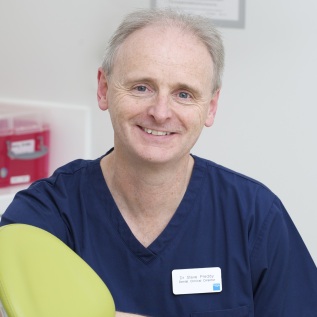Research from Bupa has found that many people avoid showing their teeth when smiling, feel the need to put their hand over their mouth when talking and even avoid having their picture taken, due to their insecurities around showing their teeth when smiling. But what are the common myths?
Steve Preddy, Head of Clinical Services at Bupa Dental Care busts some of the common falsehoods about oral health.

Dr. Steve Preddy, Clinical Director of Bupa Dental Care, Bupa UK.
Only sugar causes tooth decay
Eating too much sugar (especially processed sugar) does increase your risk of tooth decay. As the sugary food is broken down, it feeds the plaque-creating bacteria in your mouth and worsens the acids that can wear away the surface of your teeth. But even if you don’t have a lot of sugar in your diet, you’ll still be at risk of cavities if you don’t brush and floss correctly. Starchy foods also contain carbohydrates that can cause plaque to form.
Diet drinks are better for you
It’s not just the sugar in soft drinks that damages your teeth, it’s also the acidity. Over time, sugar-free fizzy drinks can cause just as much wear to the enamel, potentially leading to heightened sensitivity, cavities, or even tooth loss. The natural sugars in some fruit juices can be just as damaging. For a healthy and refreshing alternative to soft drinks, nothing beats water.
White teeth are healthy teeth
Although you might like the look of white teeth, they aren’t always a fool-proof sign of good oral health. Natural tooth colour varies in lightness, especially as we age. Just because your teeth are white doesn’t mean you can avoid visiting the dentist. You may still have cavities, infections or other oral health problems that need to be treated sooner rather than later.
Charcoal toothpaste is better for your teeth
Whilst charcoal toothpaste has become something of an Instagram trend of late, brushing with it may actually put your teeth at risk. The most important ingredient in a toothpaste is fluoride, which is crucial to prevent tooth decay, yet many of the charcoal types available now don’t contain enough of it. When choosing a toothpaste, make sure it’s from a good quality, reputable manufacturer.
Braces are just for kids
Although it’s common for children and teens to receive orthodontic treatment, more and more adults are getting in on the action. The days of train-track braces are long gone – advances in clear braces now offer a more discreet option for adults who weren’t able to address their orthodontic issues when they were younger. Systems such as Invisalign give you the ability to remove the aligners for eating, speaking or special occasions.
No need to brush baby teeth
Starting good brushing habits nice and early on sets patterns for a lifetime, leading to a life-long healthy smile and good general health. Using the correct brushing technique twice a day can prevent the build-up of plaque, reducing your child’s chances of tooth decay and gum disease. It is also important to take your child to the dentist for a regular check-up, to ensure they have good oral health and so you can address any problems that may arise early. This is especially important with tooth decay currently being the number one reason for a child needing to go under general anesthetic in the UK.
Flossing isn’t important
When people think about oral hygiene, they think about brushing, brushing and more brushing. Flossing, on the other hand, is seen as less important, a bit like cleaning behind your ears and trimming nose hair. However, while brushing can help clean the surface of your teeth, the bristles will struggle to work their way in between your teeth. Flossing cleans approximately one-third of your tooth surface, which normal brushing simply can’t reach.
The harder you brush, the cleaner you’ll get your teeth
Brushing too hard can actually harm your teeth by abrading some of the hard enamel that protects the inside of the tooth from cavities, decay and receding gums.
Hot water and lemon is the ideal morning drink
Lemon in hot water is a popular morning drink in place of tea, partly because of the concern over stains. Unfortunately, the lemon is more harmful to teeth. Stains can be removed by professional cleaning at the dentist or hygienist, whereas the acid in the lemon will erode the tooth surface which is harder to fix.
Bad teeth and gums are inherited
The spacing, alignment, size of teeth, and size of jaw are all inherited through your family lineage. But you do not inherit bad teeth, poor gums or the propensity to lose teeth; the health of your teeth and gums are directly related to how well you take care of them on a daily basis.
After eating, brush as soon as you can
This is often said but isn’t incorrect. While it might be tempting to freshen up after snacking, you should never brush immediately after eating. This is because your teeth will be weaker due to the change in the pH level in your mouth, meaning you could damage the enamel.


